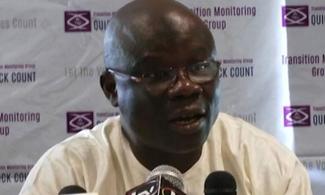
The Resource Centre for Human Rights & Civic Education (CHRICED) has totally rejected the NGO Regulation Bill, currently before the National Assembly, and called on the federal executive to deny assent to it.
The Resource Centre for Human Rights & Civic Education (CHRICED) has totally rejected the NGO Regulation Bill, currently before the National Assembly, and called on the federal executive to deny assent to it.
In a statement on Monday signed by its Executive Director, Dr. Ibrahim M. Zikirullahi, the group described the bill as a “malicious ploy by the rapacious ruling elite in Nigeria” to silence critical voices of reason and dissent, which have been courageously speaking out to expose bad governance and the plunder of national resources by the political elite.
“It is an irony that in the face of constant exposure of their misdeeds against the Nigerian people, members of the National Assembly have taken the sordid option of going after the messengers, instead of coming to terms with the message,” the statement said.
It stressed that what civil society has constantly amplified is that the Nigerian people need good and democratic governance and a prosperous country, which cannot come into being if the lawmakers and the political elite continue to greedily fritter away a huge chunk of the national wealth.
CHRICED explained that this advocacy is the sin civil society has committed to warrant the attempt to snuff out critical ideas by means of the so-called “NGO Regulation Bill.”
It also noted the various falsehoods being spread by the proponents of the bill with a view to hoodwinking the public and the international community, such as the bill being needed because NGOs have allegedly become conduits for financing the activities of terrorists.
Said CHRICED: “The fundamental question is: where are the facts to buttress this claim? Coming from a lawmaker, who should know about the primacy of facts in the public discourse, the latest resort to falsehood portrays the proponents as a band of desperate people, bent on making civil society lame and subservient to the dictates of politicians. This derogatory generalization of NGOs in Nigeria, and the attempt to tar the CSO community with one destructive brush is totally unacceptable.”
It affirmed that the CSO community in Nigeria is not averse to accountability and that there are already many mechanisms to hold errant CSOs to account should they be involved in any infractions. Nonetheless, it said, even at the height of military dictatorship, during which civil society fought valiantly to restore democracy, this kind of obnoxious attempt to cow the sector through an ill-conceived legislation was not the case.
CHRICED drew attention to the irony whereby, in a democratic dispensation in which the civil society is playing its roles, notwithstanding its challenges and constraints, idle lawmakers who have been so adept at avoiding the demands of accountability, have suddenly deemed as their most important priority, to weaken and silence CSOs.
“It is equally strange that such a serious assault on the independence and freedom of association of NGOs is coming from the All Progressives Congress (APC), which was a major beneficiary of the work done by NGOs to expose corruption in the immediate past administration,” the statement said, adding that it is strange that the APC is looking on while its members in the National Assembly launch an assault on a sector that has filled the governance void in Nigeria in several ways.
CHRICED called on the Executive to refuse assent to what it characterized as an “obnoxious and unacceptable legislation” that is nothing but a clear attempt to deny active citizens their right to associate and take action to make their communities better.
“The NGO Regulation Bill is not just an attempt to kill initiative at the local level; it is a grand design to sabotage all efforts towards open, transparent and accountable governance in Nigeria,” the group said. “It is absolutely clear to us that any legislation, which seeks to whittle down the capacity of citizens to connect and find solutions to their problems, especially at the grassroots, does not augur well for democracy and good governance.”
